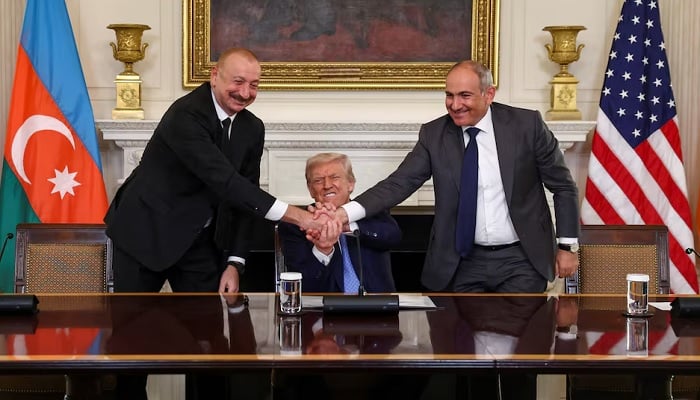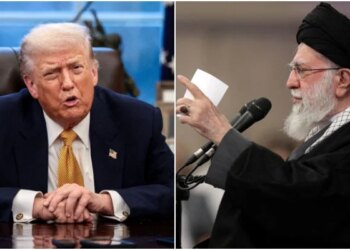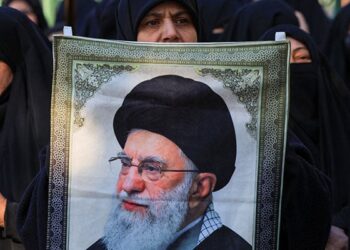Select Language:
Azerbaijan and Armenia formalized a peace accord brokered by the United States during a meeting with President Donald Trump on Friday, aiming to strengthen economic connections after years of conflict. This agreement, which could be a breakthrough if maintained, signals a notable shift in regional relations and is likely to challenge Moscow’s influence, given its historical interest in the area.
At the signing ceremony at the White House, Trump remarked, “It’s been 35 years of fighting, and now these nations are moving toward friendship. They are committed to lasting peace.” He was joined by Azerbaijani President Ilham Aliyev and Armenian Prime Minister Nikol Pashinyan.
The longstanding rivalry stems from the late 1980s when Nagorno-Karabakh—a mountainous Azerbaijani region predominantly inhabited by ethnic Armenians—seceded from Azerbaijan with Armenian backing. Azerbaijan regained full control over the territory in 2023, forcing nearly all of the 100,000 ethnic Armenians to flee to Armenia.
The agreement involves the two countries pledging to cease hostilities, establish diplomatic relations, and uphold each other’s territorial sovereignty. It also grants the U.S. exclusive development rights to a strategic transit corridor through the South Caucasus, promising to boost energy exports and resource exchanges.
In addition, the U.S. has negotiated separate agreements with each nation to expand cooperation in energy, trade, and technology sectors, including artificial intelligence. Restrictions on defense collaborations between Azerbaijan and the U.S. have also been lifted.
Both Azerbaijani and Armenian leaders lauded Trump for his role in brokering peace, with Aliyev suggesting Trump deserves the Nobel Peace Prize. “Who else, if not President Trump, should receive this honor?” Aliyev stated.
While Trump has depicted himself as a global peacemaker—claiming credit for ceasefires and peace agreements in Southeast Asia, Africa, and South Asia—he has yet to resolve conflicts in Ukraine or the Gaza Strip.
U.S. officials emphasized that this accord was achieved through multiple visits to the region and lays a foundation for broader normalization. They see it as the first resolution of several frozen conflicts near Russia’s borders since the Cold War’s end, sending a strong regional message.
The peace deal could dramatically transform the South Caucasus, a resource-rich area neighboring Russia, Europe, Turkey, and Iran, characterized by oil and gas pipelines, closed borders, and ethnic tensions. Armenia has agreed to grant the U.S. long-term exclusive development rights for the transit corridor, which has already attracted interest from nine companies, including three U.S. firms.
Advocates like Daphne Panayotatos from the rights organization Freedom Now have urged the Biden administration to use this momentum to push for the release of approximately 375 political prisoners in Azerbaijan. Despite the country’s rising prominence, especially after hosting the UN climate summit, Azerbaijan maintains a firm stance against Western criticism of its human rights practices, describing such concerns as unacceptable interference.







